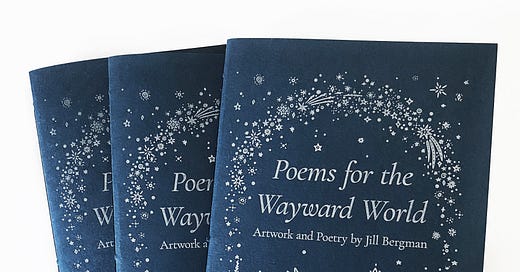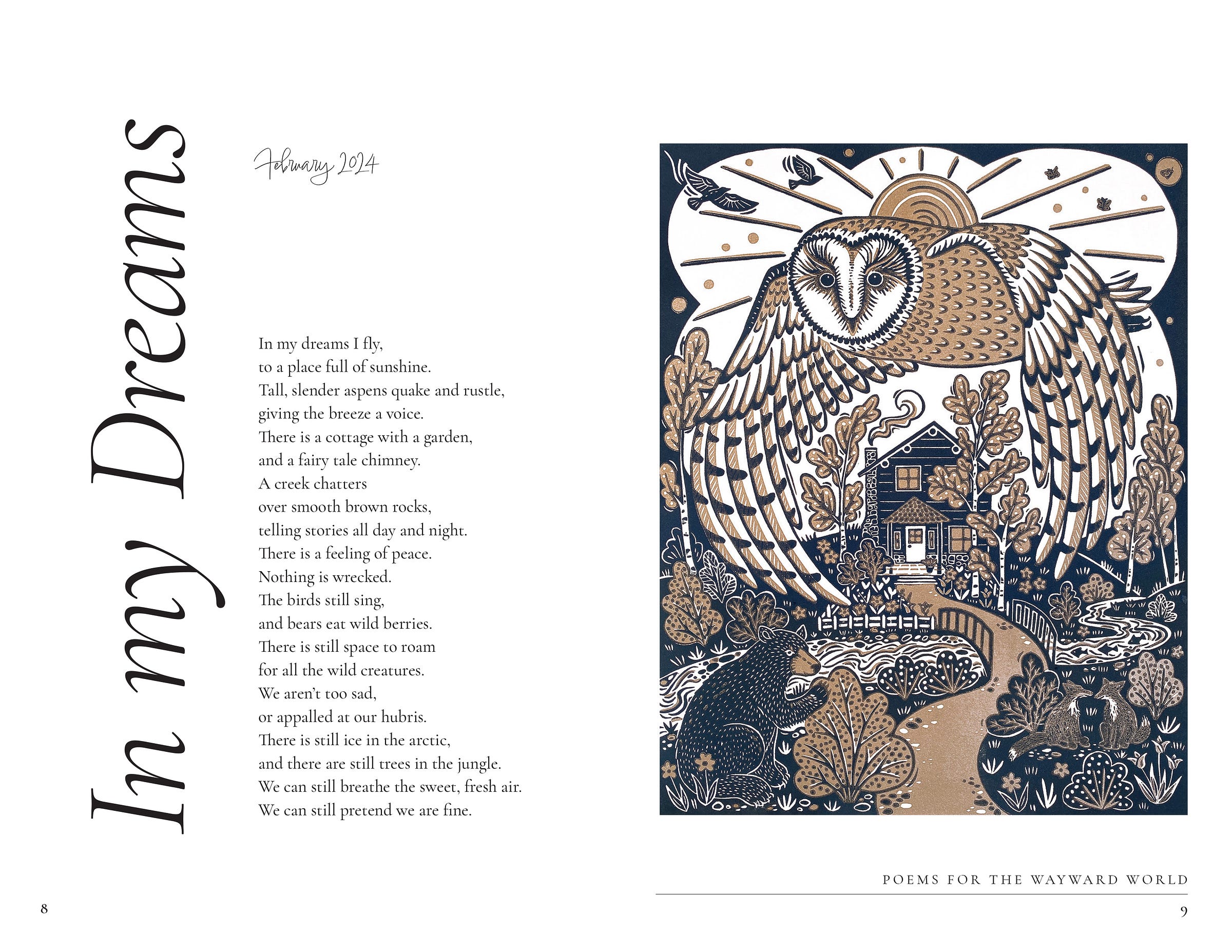Through September at Pine Moon Fine Art in Steamboat Springs, Colorado, I am having a show combining art and poetry, titled Poems for the Wayward World. In addition to fine art, I’ve also put together a ‘zine,’ a small, hand published book with 15 of my poems and associated artwork. I’ll share a couple of spreads below.
The themes of the show and book focus on the natural world, climate anxiety, wildlife, and some quirky illustration, too, for the joy of it. This show evolved to share my concern over our disregard for nature and our impacts on wild places and wild animals. Come by if you are in Steamboat! Most pieces can be seen online through September, 2024 or if later, visit my website to see them throughout the site.
After reading some interesting books about the history of North America, I was able to connect thoughts about why the prevalent American culture has minimal (but hopefully growing) respect for natural systems and non-human life. The books that I read that I’d recommend are 1491: New Revelations of the Americas Before Columbus by Charles C. Mann, and Beyond Geography: The Western Spirit Against the Wilderness by Frederick Turner.
Not being much of a history enthusiast, but definitely an avid reader in general, I thought I knew the basics. I read authors from a variety of backgrounds, including Native American. But listening to the audiobook 1491 by Mann, I realized that our understanding of the past is always evolving. Over time, new information coming to light updates our knowledge about the past, sometimes in revolutionary ways.
Beyond Geography by Turner is about the importance of myth and spiritual connection to the land. It’s amazing that it was first published in 1980, because it feels like American culture is still struggling to understand these concepts. In other words, it feels like a book ahead of its time.
This book starts WAAAAAY back in ancient times, and not in North America. FYI, it’s not very kind to Christianity. It became really interesting to me when the author arrived at the discovery of North America by Europeans. However, the earlier history lays the groundwork for why the explorers and colonizers behaved the way the did, and the utterly different ways Native Americans saw the world from those Europeans.
Thinking about the historical information and opinions in these books was heartbreaking. I was able to see how we landed in our current climate crisis. It was a big muddy thought process for me though, and my way through muddles is to make art. I also wanted to write, and combine visual art with text. But I’m not an expert, on anything other than carving linoleum, a very niche skill! So I decided to write poetry, which feels open to non-experts, and something I’ve always done, if infrequently.
The concepts I was inspired by feel huge, and I’ve only started this process. I’m hoping these thoughts will be a roadmap for my artwork into the future. The paragraphs below are what I wrote to come back and read if I felt lost while making artwork.
When the settlers of North America killed and displaced the native people, they placed their own imported values on the land. The creation stories, cultural mythology, and historical understanding of the animals and landscapes of North America were then held by only a small population of disposed people, recently decimated by disease, battles, and the targeted elimination of their game animals.
Most Americans today who live in cities don’t have a tie to the land. They don’t know historical stories or folklore that teaches respect and understanding of the earth, water, plants and animals that we depend on for life. We can listen to the stories of Native Americans, but can’t claim them if we are from a different culture. We can listen to the stories of ancestors from elsewhere, but they aren’t connected to the place where we live now.
We were misled by people in the past who saw the new continent as a place to take whatever they wanted with impunity. It’s past time to grow empathy and treat the life surrounding us with care so that it will in turn support us.
We could use a modern mythology that clarifies our peril in this rapidly changing land. We need the drive to pull together and tackle the climate crisis and loss of biodiversity. This is a time of great urgency, and also a time of great complacency by much of the population. It's confusing! But we aren’t helpless. Think of the heros that rose to lead us through past dangers. These were often regular people, like you and me, who saw the problem and chose to act instead of hiding. Now it’s our turn. This is a worldwide problem, so it doesn’t matter where in the world you live, there is something you can do now.
Listen to inspirational stories instead of doom, believe the true facts, and get to work to solve the problems. If we can do this, we will be the heros worthy of future myth-making. We can tell our grandchildren how hard we worked, where we failed, and where we succeeded. Through our stories, we can teach them respect for living beings and honor our leaders. If we dedicate ourselves right now, we can gift the future polar bears, whitebark pine, monarch butterflies, glaciers, and a better humanity.
We can tell the story of how we saved the world.
To circle back to spirituality and connection to the land, I think cultural progress has been made. Listen to what Pope Francis wrote in ‘On Care for Our Common Home.’
"When we speak of the ‘environment,’ what we really mean is a relationship existing between nature and the society which lives in it. Nature cannot be regarded as something separate from ourselves or as a mere setting in which we live. We are part of nature, included in it and thus in constant interaction with it.”
Now, go out and make art, read, write, and most importantly, save our common home!









